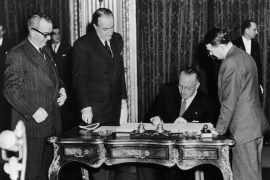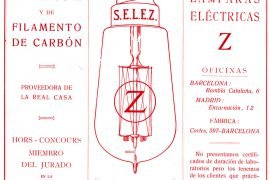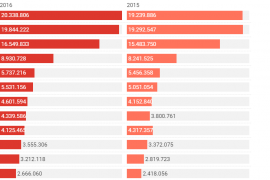In 1969, countercultural Catalan rock musician Pau Riba launched Dioptria Volume I, unanimously considered the most important Catalan rock album. A more than justified consensus, even if it was that one time. Coinciding with the anniversary, the artiste kicks off his Dioptria 50 tour on April 12 at the Joventut Theatre in L’Hospitalet as part of the Festival Barnasants programme, with backing band De Mortimers, and a crowded list of guests, featuring Sisa, Albert Pla, Joan Garriga and L’Orchestra Fireluche amongst others. He plans to tour several Catalan cities, and beyond, as on May 8 he will also play the Fun House in Madrid.
This anniversary tour coincides with a meticulous vinyl reissue by Munster Records, which includes Dioptria II—released in 1970—alongside Dioptria I.
It’s the spitting image of what never was. Fifty years later, the project has come out as I had intended: both albums together, and details such as the colour scheme of the lyrics pages, which originally was to be the colours of the Spanish Republican flag [red, yellow and purple ] and that didn’t come out in the right order then, I don’t know if by accident or not.
It also reproduces a text by the Edigsa label, attributed to Ermengol Passola, which replaced your own presentation of the record.
Yes, I had written a text in poetic prose saying: I’m leaving, I’ve had enough, I’m fed up with this society… To him—Passola, that is—it seemed that this was too bold, and he had the gall to say: well, Pau Riba is a young lad who says this now, but he’ll grow out of it… all very paternalistic, and speaking as if in the name of all Catalans. On the one hand it’s ridiculous, but on the other it’s all very surreal.
In retrospect, it also seems ridiculous that they wouldn’t let you debut the album at the Palau de la Música [then Barcelona’s premier concert hall and a sanctum for the bourgeoisie ].
Well, that was part of a slightly longer chain of events. My first intention was to debut at the Liceu [opera house, also a temple of high society ]. I wanted to put a car on the stage, and use it—the doors, the horn, the engine…—as an instrument. Ever since I was young I was really interested in the Musique concrète thing, and had gone to hear works like Peça per a serra mecànica—Piece for a Chainsaw—by Mestres-Quadreny. At the Liceu they said no. And when I suggested it to the Palau de la Música, they said no too. They argued that Raphael had recently performed there and his fans had wrecked the seats. Apparently Raphael was dangerous, malgré lui… Anyway, in the end I presented the album at the Price—so funny that at that time they only wanted my music at a boxing venue.
“It’s about the classical, petty-bourgeois, Catholic family. In my house, my mother and two grand-aunts took care of everything, and my father was the one who brought the bacon home. Based on these roles, I made an association between age-old society and women, wondering why those women didn’t rebel”
Talking of boxing, the critics who covered the premiere at the Price pretty much panned you, didn’t they?
Yeah, yeah. Not everything was my fault, but… The opening act was Música Dispersa, who played like an hour and a half. And when we went out on stage, from the second song on, backstage the venue owner was already telling the Om band guitarist Toti Soler that our time was up. I must admit that at the time I wasn’t ready to become a rock star.

The first volume of Dioptria, recorded with Om, has a more electric beat to it, while the second is more folk-psychedelic. Why this contrast?
I had discovered the Om guys when they backed [singer-songwriter] Maria del Mar Bonet on the album Jo em donaria a qui em volgués [I’d Give Myself to Whoever Wanted Me]. I liked it because they sounded like an international group, something that had never been seen here before, and I went to talk to them straight away. But between the recording of the first volume and the second, I went to Formentera [a little island just off Ibiza] to see what the heck the LSD thing was about… and everything changed. After that experience, it seemed to me that Om’s sound—not the guys, eh!—was, how should I put it… too capitalist. I had become a hippie, and I wanted something more in keeping with the natural cycles and the earth. I asked the Música Dispersa guys to back me in Dioptria II, but only two of them, Albert Batiste and Sisa, accepted. To tell the truth though, when I listen to the record, I don’t know where Sisa was…
There are also differences in theme between one record and the other.
In the first one, my/our insular male chauvinism weighs in. It’s about the classical, petty-bourgeois, Catholic family. In my house, my mother and two grand-aunts took care of everything, and my father was the one who brought the bacon home. Based on these roles, I made an association between age-old society and women, wondering why those women didn’t rebel. In the second, I speak more about myself, from my point of view. This is where L’home estàtic—The Static Man appears, a song Jaume Arnella [a Catalan singer and folklorist ] had entrusted me with. He asked me to do a song based on a quotation, I’m not sure if it was Fidel Castro or Che Guevara who said: no hay que esperar el fin del capitalismo sentado en la puerta de casa—you can’t wait for the end of capitalism sitting at your doorstep. And, of course, when I sang L’home estàtic, Arnella told me I could keep it.
“Luckily, there is this feminist force that is overwhelming even identity politics, and I like that. I think that we will gradually come to a matriarchy, or a pater-matriarchy, which would probably be best”
It’s been half a century since all that. When you approach these songs… don’t you feel a bit woozy?
So, there’s a certain je ne sais quoi. But it doesn’t stop me from getting some pride out of it, seeing that something I did fifty years ago is still valid. I still identify with it. When I sing these songs, I don’t think I’m going back to the past. I don’t feel the need to set myself in the context of a past era, although it’s clear that there have been serious changes. At that time, for example, the virtual space had not burst in like now, nor did we have communication tools we use.
Speaking of social changes, don’t you think that right now we’re experiencing a very conservative wave again?
Oh yes, these things depend a lot on the well-being of society. As well-being increases, the reactionary thing also increases. When you’re lying on the couch with a cigar, you don’t want to hear about revolution or revolutionaries. But if you don’t know how you’re going to get to the end of the week , you’re ready to go out and scream. The point is that now it’s identity that gets people mobilised, rather than the materialistic thing. Luckily, there is this feminist force that is overwhelming even identity politics, and I like that. I think that we will gradually come to a matriarchy, or a pater-matriarchy, which would probably be best. But I don’t think you can reach pater-matriarchy without first going through matriarchy, or at least a powerful feminist revolution.



















